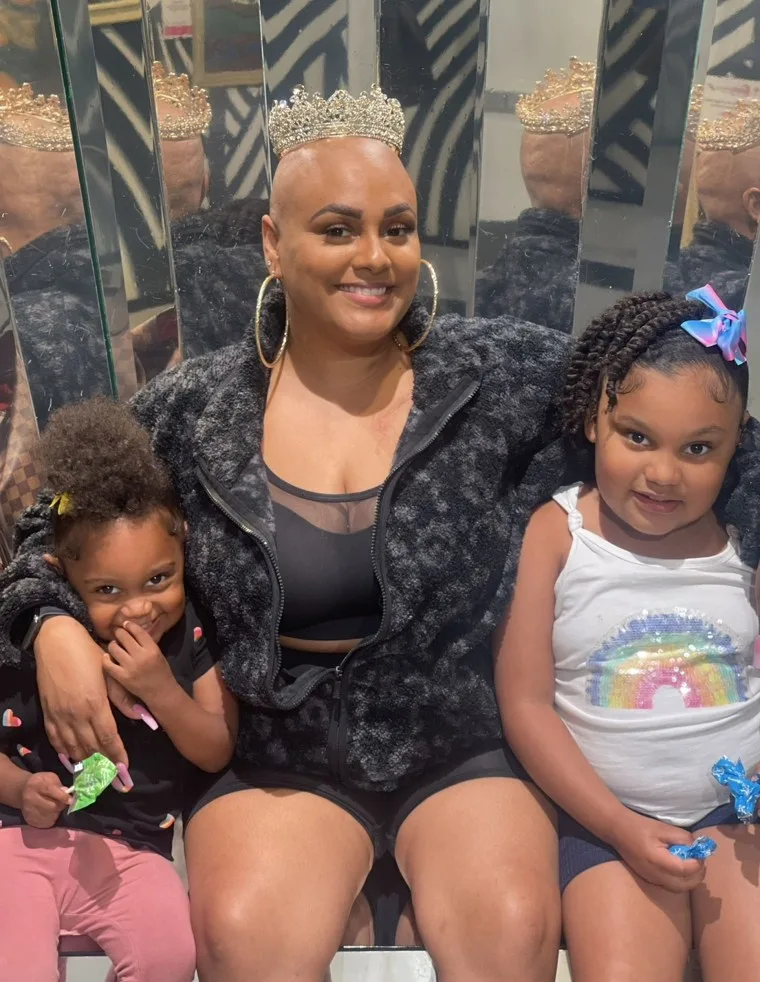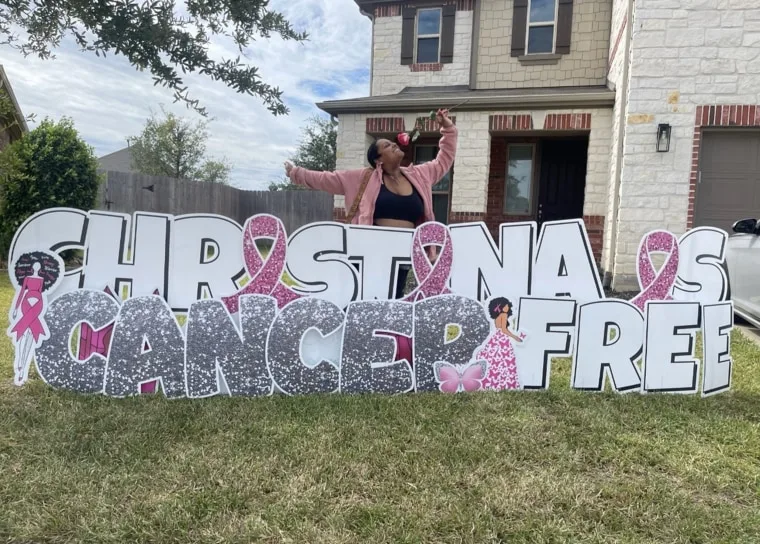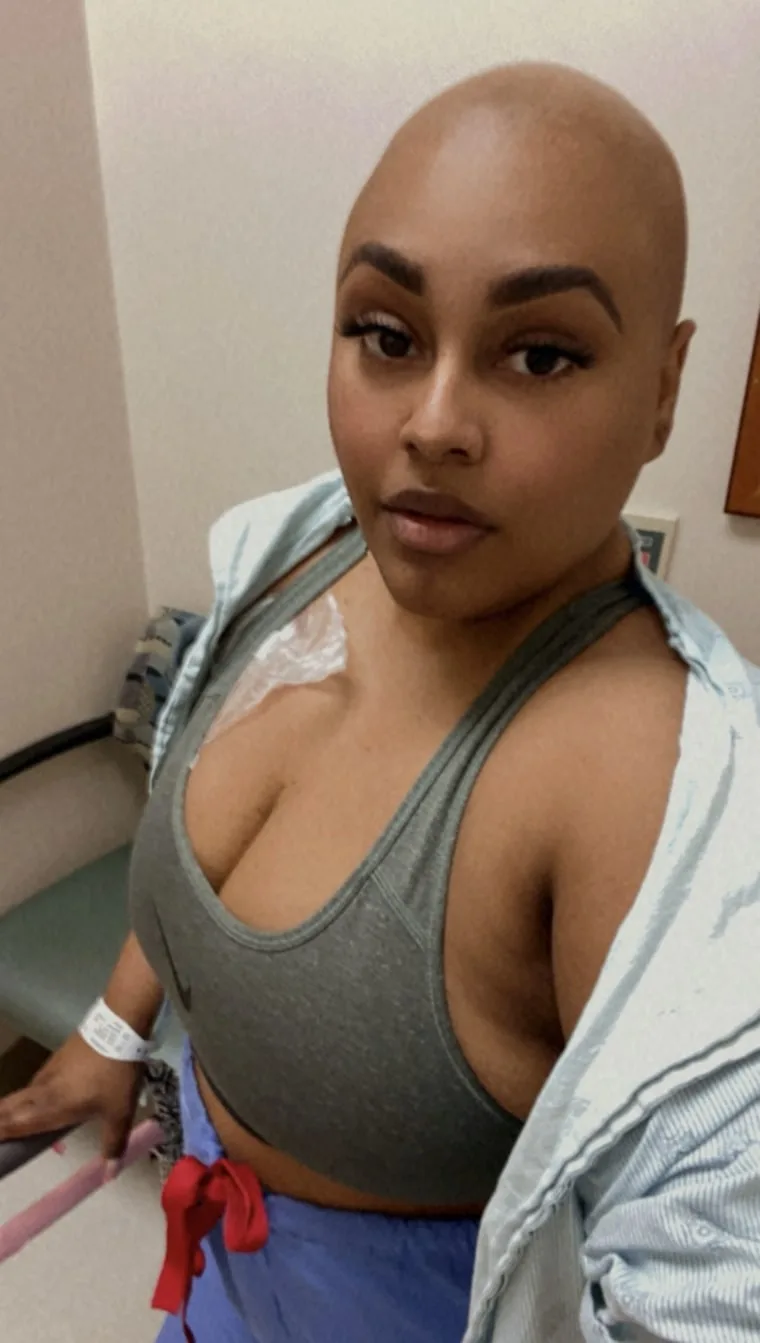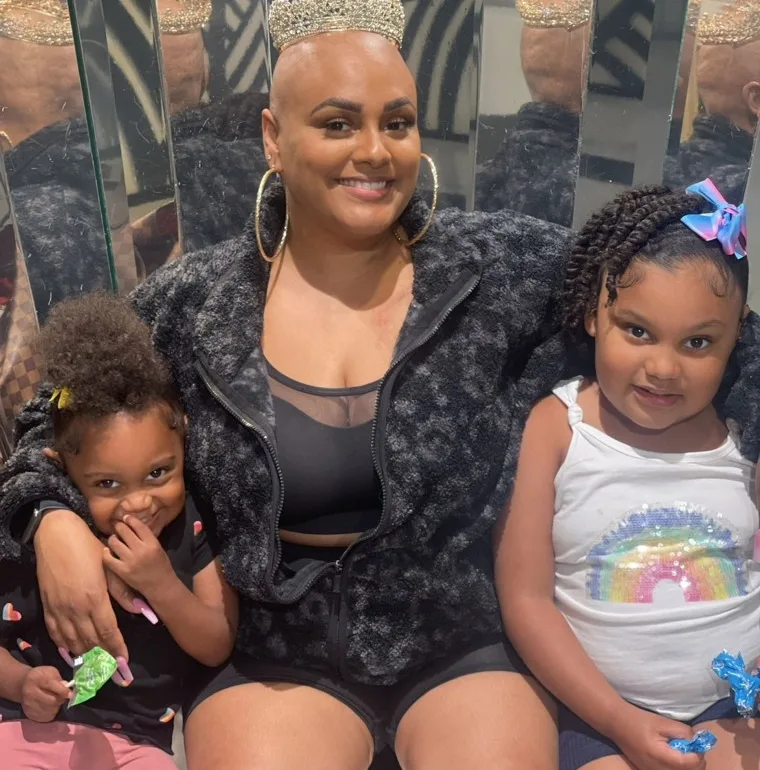Last year, Christina Mackey, then 33, was in her shower performing a breast examination when she felt a gumball sized lump. She underwent a diagnostic mammogram and learned some shocking news.

“The nurse practitioner said, ‘I’m so sorry, but you do have cancer,’” Mackey, 34, of Houston, tells TODAY.com. “I blinked once and I said, ‘What’s the plan?’” Mackey had stage 3 triple negative breast cancer, an aggressive type of cancer that does not have as many targeted therapies to address it. She was able to participate in a clinical trial for an experimental treatment, an offer that many Black women do not receive. It transformed Mackey’s outcome.
“That trial saved my life,” she says.
A lump and a diagnosis
Mackey was adopted so she is unaware of any family history of breast cancer. But she was mindful of performing self-breast examinations so she would understand when something changed in her breast. One day she sat on a bench in the shower when she felt the lump. At first, she felt stunned by the discovery and didn’t do anything. Then her friend called her, and Mackey felt inspired to make an appointment.
“If it was not for my good friend Shukura I probably would have stayed in my bed until it metastasized,” she says. “She worked on the back end with someone in her network who was connected to MD Anderson (Center Center).”
Mackey’s “first ever mammogram,” led to a biopsy that diagnosed her with stage 3 triple negative breast cancer. The mom of two daughters, 3 and 6 at the time, felt ready to act.
“I didn’t cry about cancer until I was maybe three chemo treatments in,” she says.
Mackey met with her care team to understand treatments and that’s when she heard about the clinical trial. Immediately, she agreed to participate.
“I wanted to do anything that would save my life and my oncologist said, ‘We have one big swing at this thing, and this is the best, literally the best bat to use,’” Mackey recalls. “I wasn’t scared of the trial. I was just scared of not surviving.”
While her tumor responded well to the experimental treatment, she also underwent more traditional therapies, including 16 rounds of chemotherapy, a lumpectomy and 30 rounds of radiation.
“I had such a great pathological response that I went in for a lumpectomy and a week out of my lumpectomy, I got a phone call that I was cancer-free,” she says.




Mackey did experience negative side effects from the chemotherapy and struggled to walk at one point. She had developed neuropathy in her spine, which impacted her mobility. Because she had such bad side effects, she stopped chemotherapy early. With some rest, she was able to walk again. Around the same time, her father died, and Mackey grappled with “trauma coupled with trauma.”
But being finished with active treatment felt like a relief.
“I was so grateful to be done,” she says. “Ironically, I rang the bell in breast cancer awareness month. I rang it October, 18, 2022.”
Black women and breast cancer
When it comes to breast cancer, Black women are more likely to develop aggressive types of cancer.
“There are specifically higher rates of what we call the triple negative breast cancers, also the HER2 positives,” Dr. Bridget Oppong, a surgical oncologist and deputy director of the Center for Cancer Health Equity at the Ohio State University Comprehensive Cancer Center (who was not involved in Mackey’s care) tells TODAY.com. “Depending on the studies that you look at, it is three to four times the rate of white women.”
Triple negative breast cancer, in particular, has a worse prognosis and can be difficult to treat. There are few targeted therapies like there are for estrogen positive breast cancers, she says. The types of cancer Black women have impact whether they survive, but it’s more complicated than that.
“Black women overall have 40% higher mortality from breast cancer compared to other American women,” Oppong says. “As far as the why, we still don’t know.”
One contributing factor may be that black women often have a later stage of breast cancer when they’re diagnosed.
“Studies do confirm that Black women tend to present with more advanced stages,” she says. “Historically, Black women do have lower rates of mammography utilization. So, they’re less likely to get mammograms as recommended. But also, Black women are getting breast cancers at a younger age.”
Younger Black women don’t even have the option for their cancers to be seen during routine screening. Treatment options vary too, but it’s unclear whether patients choose not to undergo mastectomies or receive all the treatment options or if doctors are not offering them.
“I suspect it’s a combination of all of the above, but the data is not very clear,” Oppong explains.
Educating Black women on the benefits of clinical trials
Black women also do not participate in clinical trials as much as other women, she adds. There are several reasons for this. Doctors offer participation in clinical trials less frequently to Black women. And, Black women worry about participating in such research as historically the medical system has taken advantage of Black people, such as the Tuskegee syphilis study or in the case of Henrietta Lacks.
“I spend time to educate patients on clinical trials,” Oppong says. “It’s something that I have them understand that it can be beneficial to allow them to have access to newer drugs.”
What’s more, Oppong says researchers need to help patients overcome challenges they face in participating in trials. Patients might struggle to find transportation or childcare, for example, making it harder for them to join research.
Seventeen years ago, Maimah Karmo found a lump in her breast when she was 31. She had to advocate for herself to receive a proper diagnosis of stage 2 triple negative breast cancer. At the time, doctors dismissed her as being too young to have cancer, but she kept pushing, thanks in part to the support of her mom, who was a nurse. Since then, she started the Tigerlily Foundation to educate and empower women about their health, including highlighting the importance of clinical trials.
“We are training patients to understand clinical trials at Tigerlily,” the CEO and founder of the organization tells TODAY.com. “We have people who are going to be supporting patients as clinical trial navigators. We’re involved with different industry groups that are pretty relevant and lead trial development. We’re taking part in different summits and sessions, and we also partner with biotech companies that get patients involved.”
Tigerlily launched “My Living Legacy,” with the support of the pharmaceutical company GSK. It’s a program to educate the Black community about the importance of clinical trials.
“It’s about knowing, yes, there is a past. These things happened,” Karmo says. “How do you now change the future for your family, for yourself and for the generation to come?”
Karmo says Tigerlily fosters relationships with drug companies to make sure that clinical trials include Black women and the studies also work for the participants and not just the researchers. So, they might ask the researchers what they’re doing to help people overcome barriers to participation. She encourages participants to continue giving feedback after the research is over.
“When you create (a trial) with the community that you’re accountable to … there’s more responsibility and it’s more oversight into what’s coming out in the final product,” she says.




Helping others
Mackey is cancer free, but still has some lingering side effects from cancer treatment, including a damaged pituitary gland, which has led to hypothyroidism, and adrenal cortisol insufficiency. She takes medications to treat both. Throughout cancer treatment, she tried to find something to be grateful for each day.
“I find gratitude,” she says. “I refuse to literally let my feet hit the ground without saying thank you for something.”
As she navigates survivorship, she looked for something to do to help her “find meaning,” and she found Tigerlily. It aligned with her experience of being an educator and her experience participating in a clinical trial.
“I was so attracted to the Tigerlily advocacy program because it’s literally educating women, especially BIPOC women, on what available clinical trials are, disparities in breast cancer diagnosis and how to get support and advocate for yourself,” she says. “It is life- preserving work.”
To Mackey, mentoring other women gives her purpose as a cancer survivor.
“I feel very honored to help empower people to find their voice in their treatment,” she says.


